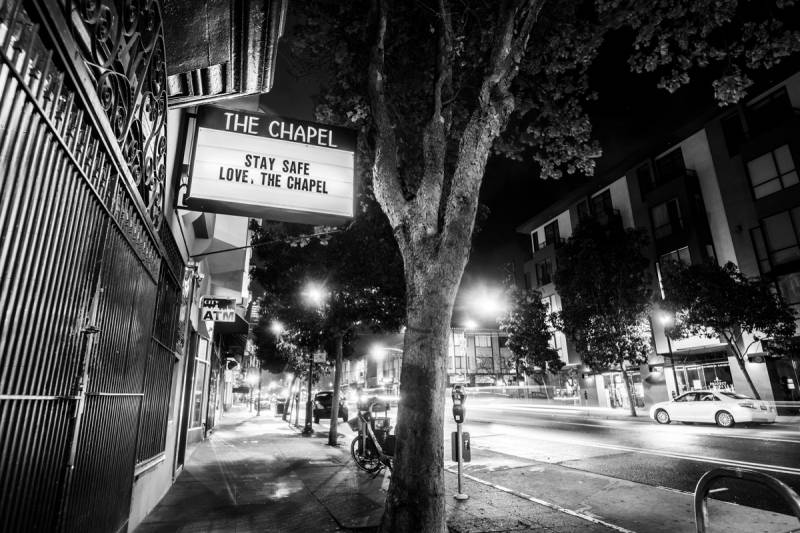When shelter-in-place orders went into effect eight weeks ago in California and the Bay Area, the booking agents, talent buyers, tour managers and promoters who comprise the live music industry scrambled to reschedule spring and summer concerts for as soon as this September.
With No Timeline for Reopening, SF’s Independent Venues Seek Lifeline

“Everyone went, ‘Okay, seven or eight months will be enough time,’” Tony Bedard, the independent rock and comedy promoter, said in an interview. Then came Governor Gavin Newsom’s statement that the resumption of large gatherings is dependent on the development of vaccines, which likely will not be complete until 2021. “Now with the four-phase plan,” Bedard said, “we know concerts are going to be last to restart, and I’m less confident about October every week.”
With local music venues’ economic hardship and uncertainty only growing more pronounced, many operators have joined the newly-formed National Independent Venue Association (NIVA).
NIVA’s 1,500 members nationwide include historic venues such as First Avenue in Minneapolis, where Prince made a name for himself; the Troubadour, a home to the 1970s Los Angeles singer-songwriter scene; and D.C.’s storied 9:30 Club. In Northern California, its members number 70 venues and promoters, a mix of small- to mid-sized venues and promoters, as well as large outfits such as Another Planet Entertainment, the Oakland-based company behind the Outside Lands music festival.
Bay Area venues that have signed on to NIVA include Bimbo’s 365 Club, Bottom of the Hill, Cornerstone Berkeley, DNA Lounge, the Chapel, Great American Music Hall, the Ivy Room, the UC Theatre, and many others. Local promoters such as Noise Pop, Ineffable Entertainment and the Stern Grove Festival are on board as well.
Bedard has already cancelled or postponed some 40 shows at independent venues, including Eli’s Mile High Club, Starline Social Club and the Ivy Room. He’s one of many local promoters and talent buyers in the difficult position of trying to financially endure an industry standstill and at the same time plan for its resumption—without knowing when that will occur or what it will look like.
Bedard worries that smaller venues without backing from Live Nation or Goldenvoice, diversified corporations with credit lines deep enough to weather the storm (though not without layoffs), will shutter before they’re able to adapt. It could be “financially less ruinous,” Bedard said, for venues to close than to continue operating at a loss whenever the concert restrictions lift.
NIVA, funded in part by ticketing companies See Tickets and Lyte, has retained the lobbyist firm Akin Gump Strauss Hauer & Feld to represent its interests in Washington. In a letter to congressional leaders, NIVA board president Dayna Frank proposed various relief measures centered on tax relief, small business loan and mortgage and rent forbearance.
Due to public health concerns, venues were some of the first businesses to close and will be among the last to reopen, Frank’s letter explains. Yet the initial federal economic relief programs “fail to sustain an industry like ours,” it continues. “Without your help, thousands of independent venues will not survive to see the day when our doors can open to the public again.”
Independent venues closing could also solidify the controversial expansion of Live Nation and AEG, parent company of Coachella promoter Goldenvoice, into the local concert market.
Live Nation, which operates the Fillmore Auditorium and the Masonic, can burn $150 million a month for the rest of the year “without any concern,” company president Joe Berchtold told Billboard. And, separately from NIVA, the companies are lobbying for their own federal bailout.
Local promoters have concerns—not just about their unemployed workers, but also the risks of rescheduling concerts too soon and forcing repeat cancellations, not to mention overpromising fees for touring artists. If venues are only allowed to reopen with half or 25 percent capacity, for example, everyone stands to earn significantly less than initially expected. On top of it all is a big audience question: will anyone come out to shows?
Dan Strachota, talent buyer at the Rickshaw Stop in San Francisco, said he’s increasingly postponing fall concerts to next year, even some originally slated for this past March or April. With potential capacity limitations, he says promoters booking touring acts are striking less-risky “door deals,” where artists receive a percentage of total ticket sales rather than their usual guaranteed fee.
The Rickshaw Stop has joined on with NIVA, and Strachota is hopeful for some sort of federal aid. The Hayes Valley venue is ineligible for a Payroll Protection Program loan, he said, and has been denied for five other regional grants and loans.
Another problem is its ticketing provider, San Francisco company Eventbrite, has laid off 45 percent of its staff. “We’re doing a lot of the work they were doing now,” Strachota said, referring to customer service and refunds processing. The company, he continued, recently changed its policy nationwide to keep 100% of the money for tickets sold until five days after the shows occur. Naturally, no shows have occurred since the shelter-in-place order.
(KQED has contacted Eventbrite for comment.)
But along with federal aid, Strachota wants clarity from local and state officials around the resumption of live music, saying reopening guidelines should better distinguish between small clubs and stadiums. To that end, he’s also a member of the Independent Venue Alliance, a new group formed separately from NIVA in part to represent local nightlife at San Francisco City Hall.
The Rickshaw Stop is raising a hardship fund for its workers, and recently sold alcohol to supporters at little more than cost, offering a free plus-one to a future gig with every curbside pickup. Strachota was happy to be reminded of the venue’s audience, and to offer some staff a day gig. “It was the first time in six weeks I woke up without a sense of dread,” Strachota said.
This story has been updated to more accurately reflect payouts from Eventbrite to the Rickshaw Stop.

